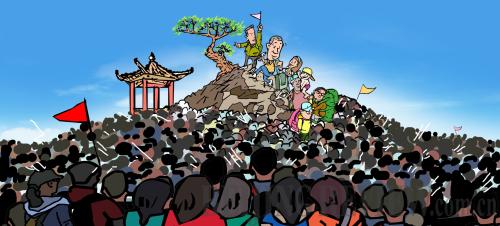|
 |
|
(LI SHIGONG) |
The Central Government abolished the national holiday tourism inter-ministerial coordination meeting in September, handing its functions to a higher ministerial joint conference. Therefore, what was formerly known to the public as the National Holiday Office was subsequently dissolved.
From its establishment in 2000, the National Holiday Office did a lot of work to ensure Chinese citizens enjoy public holidays and promote the holiday economy. However, complaints regarding its operations had also increased. From fueling a national travel rush by edging out weekends to make extended vacations to the much-teased holiday arrangement in 2014, according to which, the eve of the Spring Festival—the traditional Chinese Lunar New Year—was surprisingly not counted as a legal holiday. While questioning its effectiveness in making people's holidays enjoyable, many have pinned hopes on the newly established joint conference.
Higher demand
Bi Xiaozhe (Hunan Daily): It should be admitted that the National Holiday Office made achievements during its 14 years of operations. For instance, under its influence, Chinese people have become more attentive to the right to take holidays. Particularly, the office helped to set up the "golden week" system by making special adjustments, such as placing workdays on weekends. The holiday economy has become a driving force to stimulate domestic demand and promote industries related to tourism and leisure.
Meanwhile, there are still many tasks left uncompleted. At first, there were two "golden weeks"—namely the Labor Day holiday from May 1-7 and the National Day holiday from October 1-7—but later the first "golden week" was cut to three days. After experiencing all kinds of problems and setbacks, the quality of these national holidays remains low. Scenic spots and parks are notoriously overcrowded during holiday periods, whether long or short, while highways are constantly jammed.
The new tourism ministerial joint conference, presided over by Vice Premier Wang Yang, will guide the country's tourism industry as a whole. The National Holiday Office was led by the head of the National Tourism Administration. The new body is thus expected to do a better job.
Chinese society now values the quality of holidays more than ever before, with high expectations for paid annual leave. Since 2008, the country has formulated several regulations stressing the implementation of such paid leave. The new system is expected to play a more active and coordinative role in making holidays more diversified, ensuring greater enjoyment for the public.
Xu Lifan (Beijing Times): Once we develop a holiday model featuring regular and separate time off work, the public will be able to enjoy holidays at their leisure, in the real sense of the word.
It's clear that the government's holiday reform focuses on the establishment of a paid annual leave system, but the challenges ahead are clearly too huge to be neglected. First, employers will pose obstacles. The labor market is generally in favor of employers, and it may be difficult for employees to ask for paid annual leave. Second, the government's supervisory capability is quite limited. While there are supervisory mechanisms in place designed to punish those who neglect or deliberately deprive workers of the right to have holidays and time off, it's difficult for the watchdogs to learn of all such cases. Third, the culture or habit of leisure has yet to take shape among the public. People tend to follow others when choosing how to spend their holidays. As a result, the tourism industry in China is operated in limited ways that prevent the development of diversified options for vacations.
Public holidays amount to 115 days—including weekends—a year in China, reaching the level of moderately developed countries, but public satisfaction is lower than in Western countries. It is imperative that we develop a more efficient holiday system.
Countries where annual leave has become an established tradition are mostly welfare states. The costs may be too high for many Chinese. But workers' holiday rights can be effectively realized by the government's efforts to improve systems for leisure and holidays like paid annual leave, together with efforts within enterprises. Trade unions and workers' congresses need to play a role in balancing interests between employers and employees, so as to promote employees' capability to negotiate with employers for legal holiday rights. Once their right to paid annual leave is effectively guaranteed, employees will be able to spend their holidays in a much more convenient and enjoyable way, and the overall tourism environment will improve.
| 